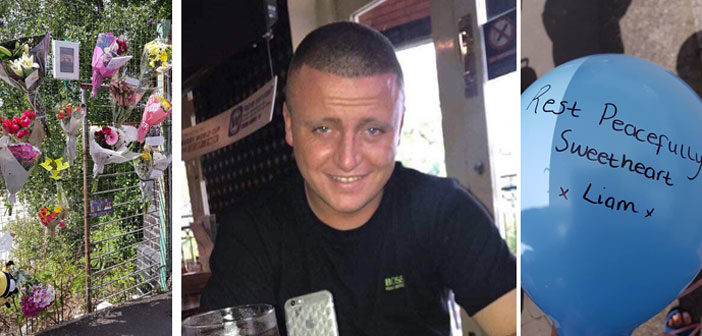MORE than three years on from the tragic death of Warrington dad-to-be Liam Cullen, his devasted family have had their questions finally answered following an inquest.
Liam Cullen died aged 28 on 29 April 2020 after falling from a height in Warrington. Yesterday an inquest in the town found that Liam died by suicide – but an inappropriate mental health safety plan contributed to his death.
The coroner Victoria Davies also found that the clinicians at Hollins Park Hospital responsible for the safety plan should have known it was was inappropriate given the circumstances.
Liam was the much loved grandson of Barbara and partner of Dawn. Only weeks before his death, Dawn had discovered that she was pregnant with their first child together. Their son who is named after Liam was born in the September following his death.
Liam had been in contact with mental health services since the age of 13 and had a diagnosis of Emotionally Unstable Personality Disorder (EUPD).
In March 2020he went to his GP and reported that he was feeling anxious again and wished to receive treatment from Wakefield House, which is where the community mental health team were based.
The following month, Liam’s family became very concerned about his mental health. On 16 April his father contacted Wakefield House and expressed his concerns about the deterioration of Liam’s mental ill-health.
Due to the Covid-19 pandemic a clinical triage call was attempted that same day but there were difficulties in communicating with Liam. A face to face appointment was offered to him for 28 April.
Liam attended the appointment with his partner Dawn. At the appointment, Liam asked to be admitted as a patient to the hospital as he felt he couldn’t keep himself safe.
After leaving the appointment Liam ran to a nearby bridge and climbed over the barrier. A passing ambulance stopped and the paramedic tried to talk him back over. At this point police also attended. Despite attempts to talk Liam back over the barrier, Liam attempted to push himself from the ledge. The paramedic was able to grab hold of his arm and he was pulled back to safety.
Liam was subsequently placed in a police car. When officers let him out to have a cigarette, he tried to escape and ran back to the barrier. Police officers restrained Liam, returned him to the car and detained him under Section 136 of the Mental Health Act 1983. Police officers then took him to Hollins Park hospital for a mental health assessment. Giving evidence at the inquest, both the paramedic and the police officers who attended the incident stated that they believed it was Liam’s intention to jump from the bridge had they not intervened.
The paramedic also said that in all of her years as a paramedic responding to mental health emergencies, Liam was the worst case she had seen and that he needed to be in a place of safety.
On the evening of 28 April 2020, Liam was assessed by two psychiatrists and an approved mental health professional. In her evidence at the inquest, the approved mental health professional said that Liam didn’t engage with the assessment, didn’t feel safe at home and felt he needed to be in hospital. She also gave evidence that a nurse on the unit told her that Liam was seeking admission to hospital to avoid a drugs debt despite the fact that there was no evidence that this was the case. All key clinicians denied knowing that Liam had jumped from a bridge earlier that day and that he had then tried to escape police custody to make a further suicide attempt. This information was freely available on the police paperwork detailing his detention under section and from the police officers who were waiting outside the assessment room.
Following his mental health assessment, doctors decided that Liam should be treated in the community. Liam was discharged and sent home in a taxi. When the taxi stopped, Liam opened the door and ran off. The following day he was found dead under a bridge.
The coroner concluded that Liam had died has a result of a cerebral injury caused by a fall from a height which was contributed to by his diagnosis of EUPD.
The inquest also found that Liam’s death was contributed to by the following issues:
A breakdown in communication at the handover prior to the Mental Health Act assessment being carried out on the evening of 28 April 2020; as a result the assessing team were not fully aware of the full circumstances;
A breakdown in communication as to where Liam was going to go overnight;
Liam had been given the contact information for the crisis line but had told them that he did not have a phone;
Inadequate communication between the mental health assessment teams;
An inappropriate safety plan which was made at Liam’s second mental health assessment.
Barbara and Dawn, Liam’s Grandma and Partner said after the inquest: “Our lives have forever changed without our Liam. His son, my great-grandchild, has been left without ever knowing his Dad. He was such a lovely, bubbly boy who should still be here today with us all.
“We are relieved that the Coroner has thoroughly investigated matters and we now know the truth of what happened to Liam. It has been devastating to know, as the Coroner found, that Liam was let down by the NHS Trust in so many different ways.
“It has been horrendous hearing the evidence, but particularly hearing the consultant psychiatrist who should have kept Liam safe be evasive, disrespectful and refuse to reflect on what had happened in his evidence to the Coroner.”
Gemma Vine of Ison Harrison Solicitors said: “This case highlights the recurrent failings in assessing individuals who are in real and immediate need or mental health support whilst in crisis.
“If a young man, who has made a very deliberate and serious attempt on his life by actively attempting to jump from a bridge, is not able to access immediate mental health support in a place of safety then it demonstrates how well and truly broken the mental health system is.
“This is compounded by the fact that the assessing doctors then attend court to try to defend the decision to send him back into the community without that support as a “robust clinical decision” rather than truly reflecting on their decision making.”
A Mersey Care NHS Foundation Trust spokesman said: “We are aware of an historic case involving a former patient of North West Boroughs Healthcare NHS Foundation Trust (NWBH) and our thoughts go out to anyone affected by these tragic circumstances.
“On 1 June 2021, Mersey Care became the new provider of services previously provided by NWBH, which ceased to exist as an organisation after that date. Mersey Care is therefore unable to comment on historic cases.
“Mersey Care has established a long standing reputation as a leading provider of mental and community health services across Merseyside and the North West and has always placed the highest priority on fulfilling our duty of care to all patients in our services.
“In the most recent inspection of its services in April 2023, the Care Quality Commission (CQC) rated Mersey Care’s services overall as good, they regarded the Trust as outstanding for being caring and well led and good for being responsive.”
*www.happyoksad.org.uk has details of local and national mental health services that can offer information, advice, support or treatment. The site is aimed at people who live or work in Warrington and includes details of bereavement support services.
When life is difficult, Samaritans are here – day or night, 365 days a year. You can call them for free on 116 123, email them at [email protected], or visit samaritans.org to find your nearest branch.




